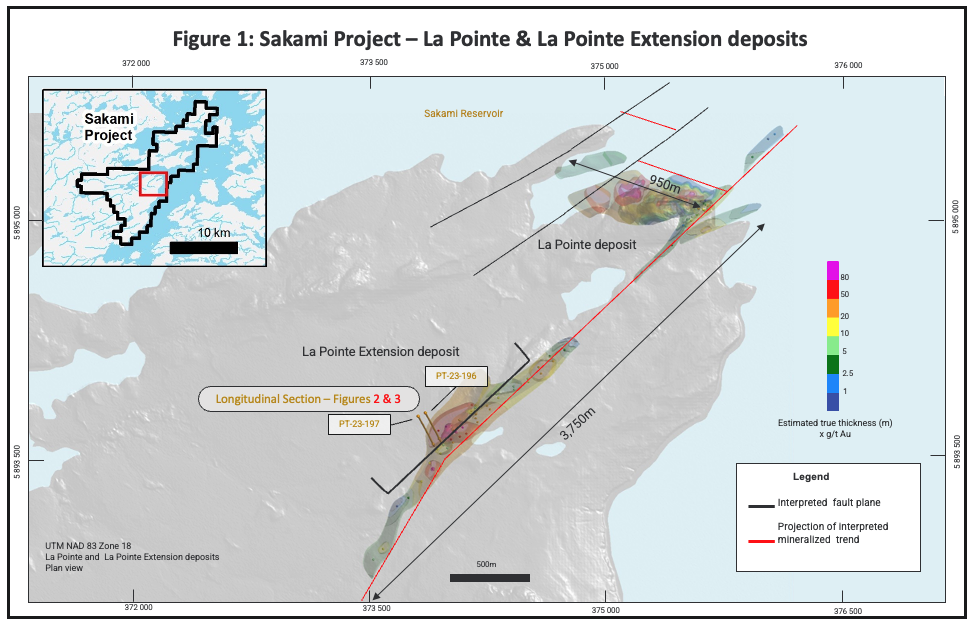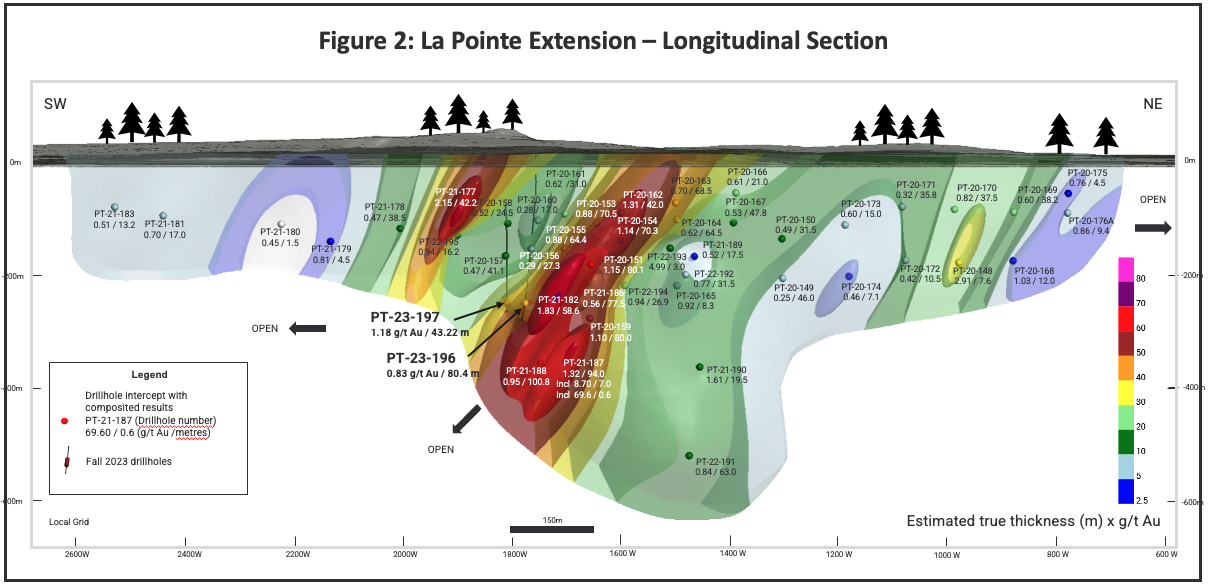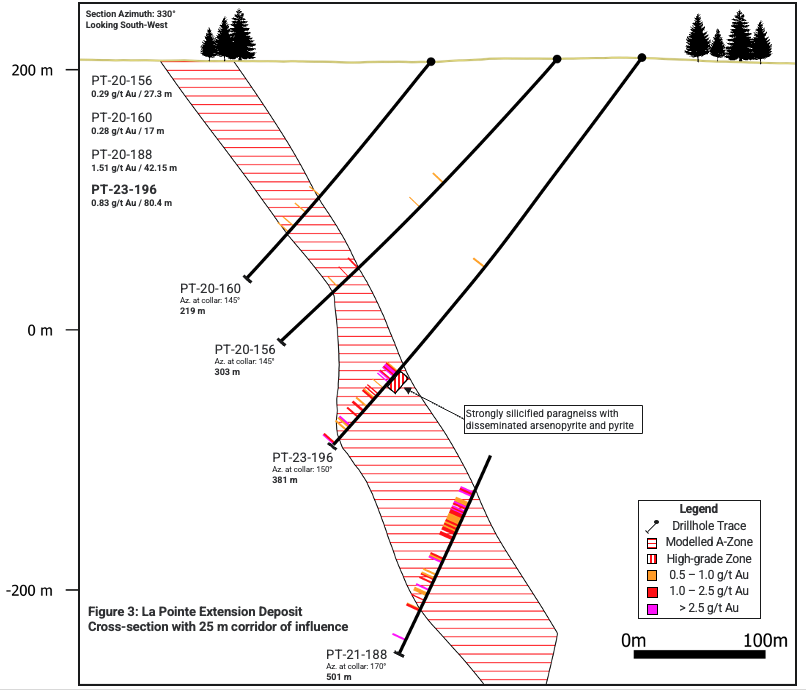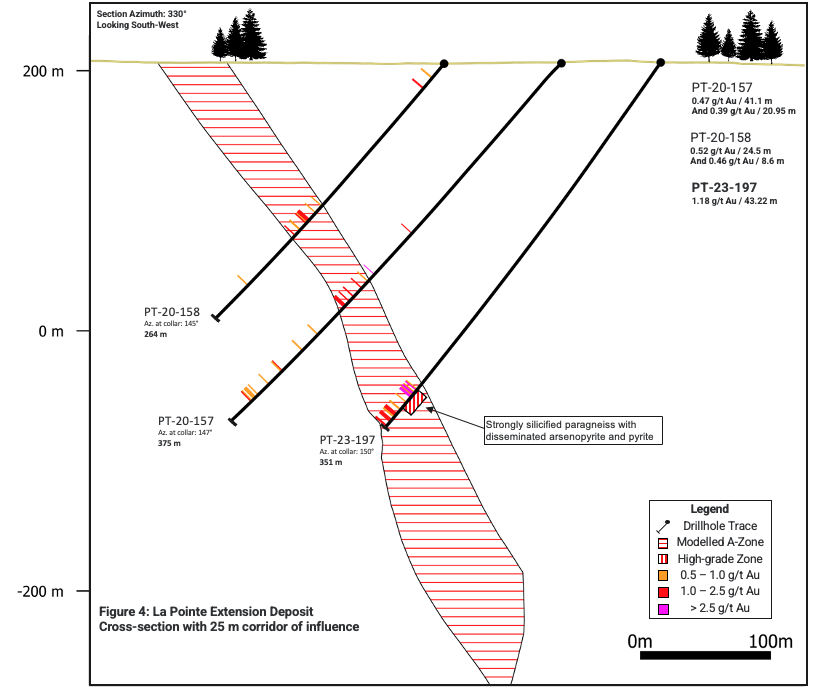Download PDF | View documents on Sedar
Montreal, February 29, 2024 – Quebec Precious Metals Corporation (“QPM” or the “Corporation”) (TSX.V: QPM, OTCQB: CJCFF, FSE: YXEP) is pleased to announce the results of the drilling program completed at the end of 2023 at the La Pointe Extension gold deposit (see press releases of November 23 and December 19, 2023). The deposit is located on the Corporation’s 100% owned Sakami project in the Eeyou Istchee James Bay territory of Quebec. The drilling program was designed to test the higher-grade portion of the La Pointe Extension deposit that could be amenable to open pit mining.
Highlights (Table 1, Figures 1, 2, 3 and 4)
The drill intersections are:
- Hole PT-21-196: 0.83 g/t Au over 80.4 m including 2.37 g/t Au over 12.2 m
- Hole PT-21-197: 1.18 g/t Au over 43.2 m including 3.86 g/t Au over 8.0 m
- These holes confirm the continuity of the sub-vertically dipping higher-grade core of the deposit (500 m strike length, a depth of 400 m with an estimated average true thickness of 40 m, up to 66 m) in the central part of the deposit.
The two holes, totalling 732 m, intersected strongly silicified paragneiss that characterizes the mineralized zone with the presence of disseminated arsenopyrite and pyrite. Both holes ended in mineralization. This modest drill program demonstrates a widening of the mineralized zone which validates further drilling at the La Pointe Extension deposit.
Normand Champigny, QPM’s Chief Executive Officer, stated: “We are very encouraged by these drill results. They confirm the presence of the higher-grade core of the La Pointe Extension. Mineralization remains open at depth and along strike. We are completing a full review of drill targets on the Sakami project including La Pointe Extension to guide our future drilling.”
Complete assay results and calculated composite grades released to date are available on QPM’s website (https://www.qpmcorp.ca/en/projects/sakami-technical-information/ ).
Quality Assurance/Quality Control
Top-to-bottom core sampling was conducted for the drill program; sample lengths typically ranged from 0.5 to 1.5 m. Core was split in half using a hydraulic core splitter capable of splitting pieces up to 12 cm-long. Core technicians were instructed to clean dust and core fragments from surfaces inside the splitter between samples, in order to mitigate sample contamination. Half of the core was submitted to ALS Global for geochemical analyses. The other half of the core was retained in core boxes for future reference.
QA/QC materials were inserted in every 25 samples in the sample stream. These samples alternated between blank material, to test for possible gold contamination between samples, and certified reference materials (CRMs), to test for analytical accuracy within the sample batch. Gold CRMs for this program were sourced from OREAS North America Inc., and include a low-grade standard (OREAS-231: known value of 0.542 g/t Au), and higher-grade standard (OREAS-238: known value of 3.03 g/t Au). All inserted QA/QC samples from this drill program returned analyses within the tolerance limit for each certified value. Each core sample was packaged in a secured sample poly bag with corresponding sample number and tag. Samples were sequentially grouped in batches of 5-10 samples and sealed in large ‘rice’ bags. As part of the chain of custody protocols, signing and maintenance of tracking logs is performed and receipts when samples are shipped from the project site.
Routine gold analysis was conducted on all samples using a 30-gram fire assay (ALS method codes: Au-AA23). Samples that returned ≥5 g/t Au in the routine fire assay triggered an ‘over-limit’ analysis by 30-gram fire assay and gravimetric finish (ALS method code: Au-GRA21). For over limit samples, the fire assay and gravimetric finish is reported instead of the standard fire assay value. Other elements were analyzed using a thirty-six element, aqua regia with ICP-AES finish package, applied to all samples (ALS method code: ME-ICP41).
The drilling program was supervised by GeoVector Management Inc. and the drilling was performed by Forage Val d’Or.
Qualified Persons
Normand Champigny, Eng., Chief Executive Officer of the Company, and Dr. Éric Hebert, P.Geo., Senior Geological consultant, member (#0842) of the Ordre des Géologues du Québec, are both qualified persons within the meaning of National Instrument 43-101 on standards of disclosure for mineral projects. They have reviewed and approved the technical information contained in this press release.
About Quebec Precious Metals Corporation
QPM is an exploration company with a large land position in the highly prospective Eeyou Istchee James Bay territory, Quebec, near Newmont Corporation’s Éléonore gold mine. The company focuses on advancing its Sakami Gold project and its newly discovered, drill-ready Ninaaskuwin lithium showing on the Elmer East project. In addition, the Company holds a 68% interest in the Kipawa/Zeus rare earths project located near Temiscaming, Quebec.
For more information please contact:
Normand Champigny
Chief Executive Officer
Tel.: 514 979-4746
nchampigny@qpmcorp.ca
Neither TSX Venture Exchange nor its Regulation Services Provider (as that term is defined in the policies of the TSX Venture Exchange) accept responsibility for the adequacy or accuracy of this release.
Forward-Looking Statements
This release includes forward-looking statements. Often, but not always, forward-looking statements can generally be identified by the use of forward-looking words such as “may”, “will”, “expect”, “intend”, “plan”, “estimate”, “anticipate”, “continue”, and “guidance”, or other similar words and may include, without limitation statements regarding plans, strategies and objectives of management, anticipated production or construction commencement dates and expected costs or production output.
Forward-looking statements inherently involve known and unknown risks, uncertainties and other factors that may cause actual results, performance and achievements to differ materially from any future results, performance or achievements. Relevant factors may include, but are not limited to, changes in commodity prices, foreign exchange fluctuations and general economic conditions, increased costs and demand for production inputs, the speculative nature of exploration and project development, including the risks of obtaining necessary licences and permits and diminishing quantities or grades of resources or reserves, political and social risks, changes to the regulatory framework within which the entity operates or may in the future operate, environmental conditions including extreme weather conditions, recruitment and retention of personnel, industrial relations issues and litigation.
Forward-looking statements are based on the entity and its management’s good faith assumptions relating to the financial, market, regulatory and other relevant environments that will exist and affect business and operations in the future. There are no assurances that the assumptions on which forward-looking statements are based will prove to be correct, or that the business or operations will not be affected in any material manner by these or other factors not foreseen or foreseeable by the entity or management or beyond the entity’s control.
Although there have been attempts to identify factors that would cause actual actions, events or results to differ materially from those disclosed in forward-looking statements, there may be other factors that could cause actual results, performance, achievements or events not to be anticipated, estimated or intended, and many events are beyond the reasonable control of the entity. Accordingly, readers are cautioned not to place undue reliance on forward-looking statements.
Forward-looking statements in this release are given as at the date of issue only. Subject to any continuing obligations under applicable law or any relevant stock exchange listing rules, in providing this information the entity does not undertake any obligation to publicly update or revise any of the forward-looking statements or to advise of any change in events, conditions or circumstances on which any such statement is based.
Table 1: Summary of significant drill hole assay results from the fall 2023 program,
Sakami project – Press release of February 29, 2024

Notes:
- All widths are drill-indicated core length.
- Drill holes are generally planned to intersect mineralization as close to perpendicular to strike as possible.
- All gold values presented are not capped.
- April 09, 2025 The Cree Trappers Association, the Cree Hunters Economic Security Board and Mining & Exploration Companies Approve 2025 Funding to Continue the Reconstruction of Cabins Burnt during the 2023 Forest Fires, James Bay, Quebec
- March 26, 2025 Fury Gold Mines and Quebec Precious Metals Update Merger Process
- February 26, 2025 Fury Gold Mines Limited to Acquire Quebec Precious Metals Corporation
- January 17, 2025 Quebec Precious Metals Receives Payment of $200,000 from the Sale of Non-Core Asset in Ontario
- November 26, 2024 Quebec Precious Metals Reports Consistent +20m Thick Spodumene-Bearing Pegmatite Up to 150m Deep from its Maiden Drilling Program on its 100%-owned Lithium Ninaaskumuwin Discovery, James Bay, Quebec
- November 07, 2024 Quebec Precious Metals to Issue Shares in Payment of Services and Deferred Share Units
- October 31, 2024 The Cree Hunters Economic Security Board, 16 Mining & Exploration Companies Contribute $750,000 For The Reconstruction Initiative Forest Fires Fund 2023, James Bay, Quebec
- October 30, 2024 Quebec Precious Metals Intersects 22.9 m of Spodumene-Bearing Pegmatite in the First Drillhole of its Maiden Drilling Program on its 100% Owned High-Grade Lithium Ninaaskumuwin Discovery, James Bay, Quebec
- October 21, 2024 Quebec Precious Metals Begins Maiden Drilling Program on its 100% Owned High-Grade Lithium Ninaaskumuwin Discovery, Situated Near the Galaxy Project to be Acquired by Rio Tinto, James Bay, Quebec, Announces Private Placement
- September 19, 2024 Quebec Precious Metals Congratulates Harfang Exploration on its High-Grade Gold Discoveries near the Sakami Project and Provides Update on Gold and Lithium Exploration Initiatives in James Bay
- August 09, 2024 Quebec Precious Metals to Issue Shares in Payment of Services and Deferred Share Units
- July 17, 2024 Quebec Precious Metals Announces Results of Annual Shareholders Meeting, Grants Deferred Share Units and Stock Options
- June 27, 2024 Quebec Precious Metals Congratulates Ophir on its Spodumene Discovery near the Elmer East Project, James Bay, Quebec
- June 26, 2024 Quebec Precious Metals Granted Financial Support from Quebec Government for Lithium



